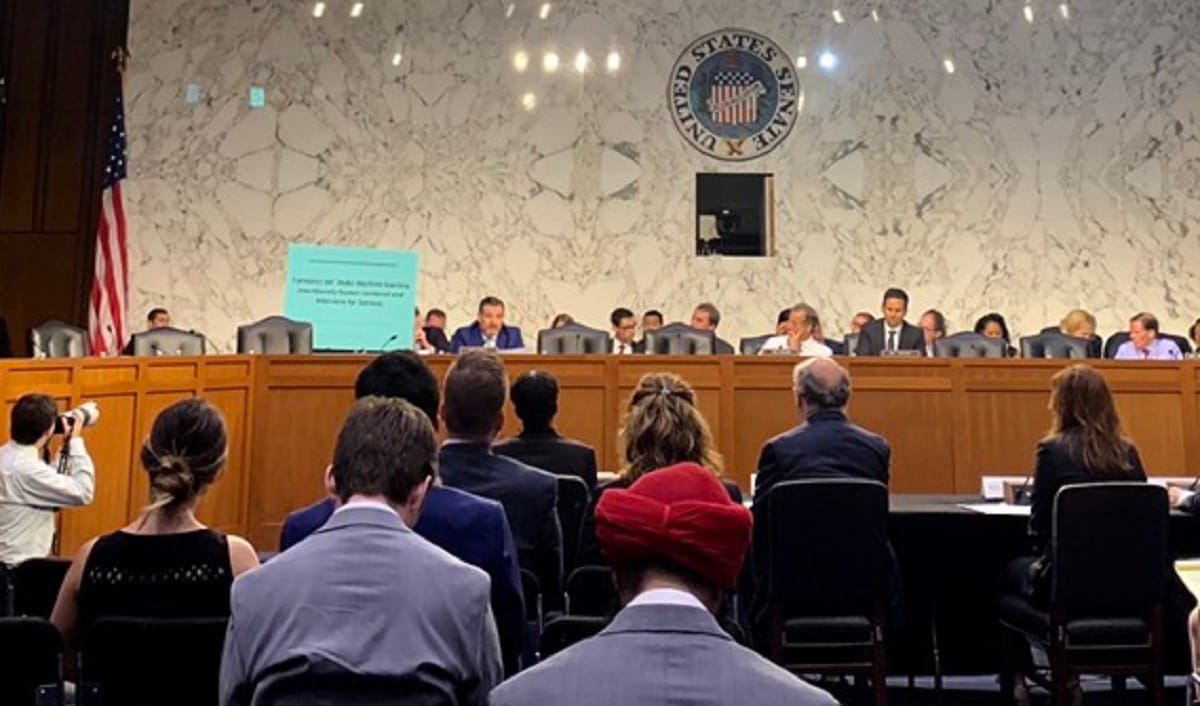Bipartisan Group of Senators Stoke Fears About Google’s Neutrality and Influence in 2020 Election
WASHINGTON, June 25, 2019 — Fears about Google’s potential ability to influence the upcoming 2020 election ran rampant at a Senate hearing on Tuesday. That, coupled with allegations that the search engine giant inappropriately benefits from federal protections against liability, created a pressure c
Em McPhie

WASHINGTON, June 25, 2019 — Fears about Google’s potential ability to influence the upcoming 2020 election ran rampant at a Senate hearing on Tuesday.
That, coupled with allegations that the search engine giant inappropriately benefits from federal protections against liability, created a pressure cooker environment for Google’s witness before the Commerce Communications, Technology, Innovation and the Internet Subcommittee.
Sen. Ted Cruz, R-Texas, aggressively grilled Google UX Director Maggie Stanphill over the company’s politics. He repeatedly asked her if she knew of any senior executives who voted for Trump in 2016, and claimed that public records demonstrated that Google employees donated significant funds to Democratic nominee Hillary Clinton, and none to Donald Trump’s campaign.
Several other senators also raised concerns about Google’s potential election influence.
Sen. Jon Tester from Montana, a Democrat, said that he believes Google executives could “literally sit down at a board meeting and determine the next president.”
Cruz raised the issue of an undercover video released on Monday by Project Veritas, a controversial conservative group frequently criticized for publishing false or misleading information.
The excerpts of the video from Monday appeared to showed Google official Jen Gennai, the head of responsible innovation, making statements that antitrust action against Google was a bad idea because smaller companies would be unable to prevent “the next Trump situation.”
Cruz discussed the “Trump situation” statement as if it referred to the election of Trump. But, in a Monday evening commentary about the secret recording, Gennai said that her comment was actually referring to Google’s ability to take action against online foreign interference and misinformation.
Sen. Ron Johnson, R-Wi., joined Cruz in doubting the objectivity of major platforms, claiming that Instagram prompted new accounts to follow a list of exclusively liberal publications and commentators without any interest from the user.
Subcommittee Chairman John Thune, R-S.D., said that if results were truly unbiased, a Google search for his own name should return results from Fox News rather than from The New York Times.
Several Democratic senators, including Tester, expressed concern about whether YouTube’s recommendation algorithm could radicalize users by recommending increasingly extreme content, citing as an example the presence of white nationalist and white supremacist videos in the site’s recommended video queue.
Stanphill, whose work at Google is focused on the platform’s Digital Wellbeing Initiative, was unable to give a specific reason for these results.
She said that Google builds products for everyone and has systems in place to prevent bias.
AI Now Institute Director Rashida Richardson pointed out research showing that there are no partisan disparities in search results. Results are affected by the veracity and timeliness of the content, which can sometimes have partisan implications.
Top search results and suggestions can also stem from which accounts have the most content and popularity, said Stephen Wolfram, CEO of Wolfram Research.
YouTube, Facebook, Twitter, and other major social media platform operators have taken steps in recent years to crack down on harassment, hate speech, extremist content and other violations of their platforms’ terms of service.
Because that enforcement has often ensnared conservative activists, some prominent Republicans—including President Trump—allege that social media platforms’ enforcement of their terms of service is biased against conservatives.
Many conservatives, including Cruz in his remarks on Tuesday, said that the immunity provided to Google and others under Section 230 of the Communications Decency Act was conditioned on the entity serving as some kind of a neutral public forum.
Responding to Cruz’s question, Stanphill seemed to confirm that Google sees itself as fulfilling this role.
But Section 230 does not include a requirement of political or other neutrality in exchange for protection from liability for users’ speech. Online platforms are legally permitted to regulate content at their discretion.
Section 230, which was passed with almost unanimous bipartisan support, was designed to ensure that online services would be safeguarded from liability for taking steps to moderate content on their systems.
This would likely be changed were the “Ending Support for Internet Censorship Act,” introduced last week by Sen. Josh Hawley, R-Mo., to take effect. That bill would condition platforms’ Section 230 protections on whether the Federal Trade Commission certifies that their terms of service enforcement is “politically neutral.”
(Photo of Sen. Cruz questioning Google witness Maggie Stanphill.)









Member discussion